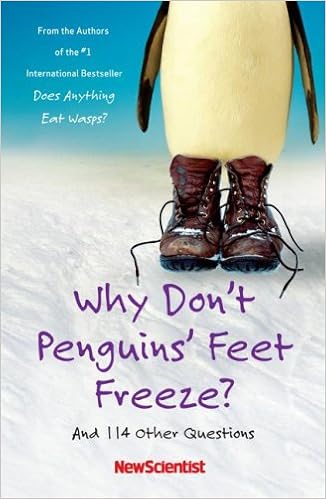
Why Don't Penguins' Feet Freeze?: And 114 Other Questions
Paperback – Bargain Price, June 5, 2007
Description
From Publishers Weekly A sequel of sorts to the bestselling Does Anything Eat Wasps?, this compilation of readers' questions and answers published in "The Last Word" column of New Scientist Magazine prove there really is no such thing as a stupid question: reader questions "Why is nasal mucus often green?"; "Why doesn't superglue stick to the inside of its tube?"; "Why is red meat red and white meat white?"; and "What time is it at the North Pole?" all draw serious consideration from their fellow readers, as well as personal stories, myths, jokes and even a poem (on why the sea is salty). Readers will learn that helium atoms are small enough to diffuse through the elastic material of a balloon, which is why balloons deflate; they'll also learn how to hypnotize a mynah bird and why "fish don't fart"; the conflagration of trivia, knowledge, anecdote and humor should entertain just about anyone. Copyright © Reed Business Information, a division of Reed Elsevier Inc. All rights reserved. From Booklist The latest collection of "Last Words" columns from New Scientist magazine, in which experts in various fields responds to readers' questions, is entertaining and enlightening. Sorted into several categories--"Our Bodies," "Weird Weather," etc.--the questions deal mainly with everyday matters. Why do we sneeze when we emerge from the shade into the light? (Theories vary.) Why do our knuckles make that sound when we crack them? (Bubbles of nitrogen gas popping in the joints.) Why do we cry when we slice an onion? (Amino acids are released into the air, acting as an irritant.) We learn a lot of interesting stuff, and it's surprising how many common questions have no definitive answer: for example, hot water either does or does not freeze faster than cold water, depending on whom you listen to. Trivia nuts, especially fans of the earlier book Does Anything Eat Wasps? (2006), not to mention David Feldman's long-running Imponderables series, will eat this one up. David Pitt Copyright © American Library Association. All rights reserved New Scientist is a science magazine for everyone, young and old, amateur and professional. With a circulation approaching 160,000 and a worldwide readership of more than half a million, it is among the most popular of all popular science magazines. Read more
Features & Highlights
- • What time is it at the North Pole? • What's the chemical formula for a human being? • Why do boomerangs come back? • Why do flying fish fly? • Do the living really outnumber the dead? • Why does lightning fork? • Why does the end of a whip crack? Everyone has at one time or another thought up odd questions like these, questions that are strange, intriguing, maybe even impossible to answer. Making your morning omelet, perhaps you've wondered why most eggs are egg shaped. Or maybe, the last time you walked on the beach, you felt compelled to ask why the sea is salty. Watching Polly sit on her perch, have you ever marveled at how she stays there -- even when she's asleep? Well, the readers of New Scientist's wildly popular, long-running column "The Last Word" thought of these questions, too, and weren't afraid to ask them.
- Why Don't Penguins' Feet Freeze?
- is a brilliant collection of questions and answers for everyone who enjoyed the international, runaway bestseller
- Does Anything Eat Wasps?
- Guaranteed to amaze, inform, and delight with topics such as the human body, plants and animals, weird weather, and our wacky world, it'll stump you, enlighten you, entertain and amuse you.





